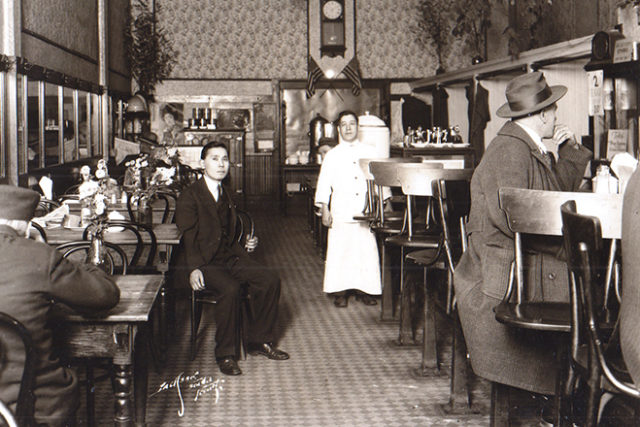by Stephanie Ikeda
“I came to Seattle in 1907, at age 17, to study the English language. I was not originally planning to stay, but I liked America better than Japan.” – Genji Mihara
Genji Mihara: An Issei Pioneer is the Japanese Cultural & Community Center of Washington (JCCCW) feature exhibit on the life of the Issei (first generation Japanese immigrant) leader Genji Mihara (1890-1982). The exhibit opened to the public on May 21, with a private showing on May 20 for Mihara’s relatives and family friends.
The exhibit is the first product of a larger research project on the long and distinguished life of Genji Mihara, who immigrated to Seattle in 1907 as a young man with the hope of supporting his parents in Japan. Project Researcher Heather Chan and Museum Manager Stephanie Ikeda co-curated the exhibit, which contains original photos and artifacts donated by the Mihara family. The artifacts and images illustrate the newly compiled historical research which produced several new oral history interviews and translated existing ones, including an interview recorded with Mihara himself in the 1970s by current JCCCW Board Member Dee Goto.

Mihara’s connection with JCCCW itself is decades long. Though he didn’t live to see the official establishment of JCCCW, he was invested in the idea of opening a Japanese Cultural Center in Seattle. Moreover, Mihara was also involved with the Japanese Community Service and Seattle Japanese Language School for most of his life. The original Language School buildings are preserved today as JCCCW’s main campus, and there are many photographs of Genji in front of the buildings as they appear today. The Language School program also continues in the present as the oldest continuously operating Japanese school in the mainland U.S.
An Issei Pioneer is significant as a historical case study of the experiences of Seattle Issei. Mihara’s immigration and pre-World War II experience from 1907-1941 illustrates the growth of Seattle’s Japantown, where he was a restaurant owner and community member. The story then moves to Mihara’s only extended time away from Seattle, when he was arrested following the attack on Pearl Harbor. The exhibit focuses especially on the lesser-known Department of Justice detainment centers, where Mihara and hundreds of other Issei men were kept separated from their families living in War Relocation Authority camps during WWII. Notably, Mihara was also a member of the community core of Seattle Issei who returned to the city following the war to help other Japanese Americans rebuild their lives here.
Other unique sides of Mihara’s legacy are shown through the exhibit. Though he was mostly known as a leader and representative of the Seattle Japanese community, Mihara was also an award-winning poet, a small business owner, a devout Presbyterian, and devoted family man. Despite preferring to live in the U.S., Mihara played a key role in U.S.-Japan relations of the time through his leadership connections plus organization of charity efforts for his home country.
Highlights of the exhibit include the original handwritten letter Mihara sent to his father upon his departure from Japan, and a translated selection of his Japanese poetry. The most significant poem composed by Mihara was inspired by the view of Mt. Rainier from JCCCW, which Mihara enjoyed seeing regularly from the front steps of the buildings. The poem was selected as a winner of the Emperor of Japan’s poetry contest in 1958.
The event for the Mihara family brought over 30 relatives from four generations all over the U.S. and as far as Japan. Mihara’s childhood home is still occupied by his great-nephew’s family, who lives in Mihara’s childhood home in Shimane Prefecture and traveled to Seattle to see the exhibit and learn about Genji’s legacy.

The exhibit is located near Mihara’s former office, now the front office for JCCCW and the Japanese Language School. The support of Mihara’s family members, 4Culture’s Heritage Projects grant, staff and volunteers created a project that honors the local, national and international legacy of an exemplary Issei pioneer.
Admission to An Issei Pioneer as well as its companion exhibit Hunt Hotel: Unsettled/Resettled is free and open to the public Monday-Friday, 10-5. Please contact JCCCW in advance to schedule guided and group tours.







